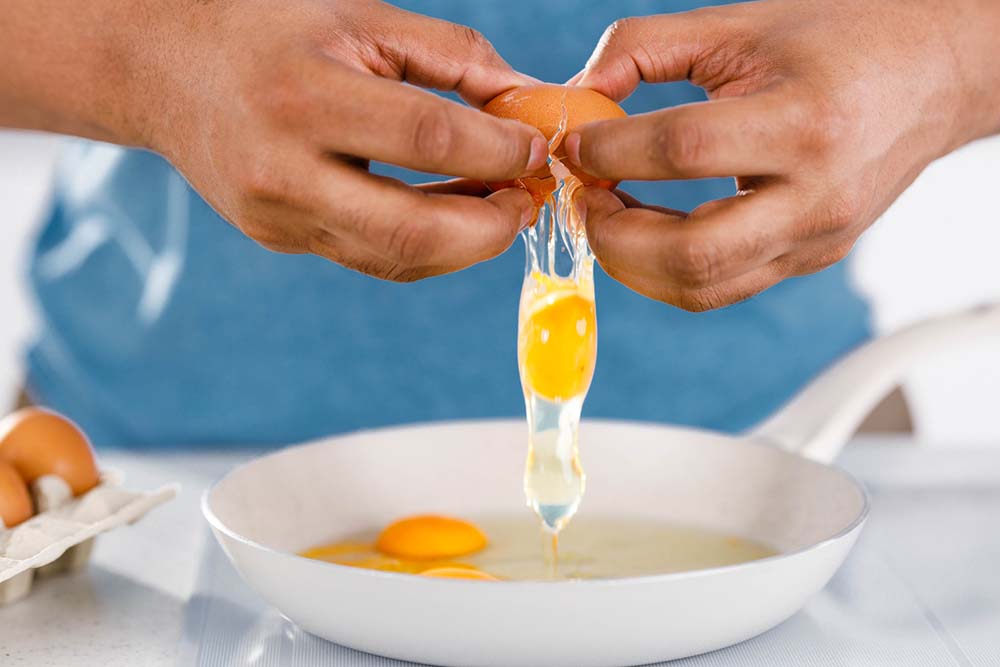Adding a cracked raw egg to dog food can provide extra nutrients. Some dog owners commonly do this. More details about Cracked Raw Egg Over Dog Food
A raw egg cracked over your dog’s regular kibble can boost their diet with beneficial proteins, fatty acids, and vitamins, enhancing their meal nutritionally and in terms of taste. Ensuring the egg is fresh is essential to minimize the risk of salmonella or other bacterial infections.
A dog’s diet enriched with high-quality proteins aids muscular development and maintains healthy skin and a glossy coat. Pet owners value natural and unprocessed food components, making raw eggs appealing to their furry friends’ diets. Always consult a veterinarian before significantly changing your pet’s diet, as individual health needs may vary.

Credit: www.justfoodfordogs.com
The Nutritional Powerhouse Of Raw Eggs
Raw eggs are a treasure trove of nutrition for your canine friend. Like a secret ingredient
that turns a good dish into a great one, a raw egg can transform your dog’s regular meal into a
nourishing feast. Packed with protein, essential fatty acids, vitamins, and minerals, it’s more than
just a treat; it’s a health boost in a shell!
Proteins And Amino Acids Essential For Dogs
Dogs need protein to build, heal, maintain body tissues, and protect their health.
- Egg protein ranks high in biological value.
- It contains all the essential amino acids.
- Amino acids in eggs support growth and muscle development.
Vitamins And Minerals Found In Eggs
Eggs contain various vitamins and minerals crucial for a dog’s well-being.
| Vitamin | Benefit |
|---|---|
| Vitamin A | Improves vision and immune function |
| Vitamin B12 | Essential for brain health and energy |
| Riboflavin (B2) | Aids metabolism and cellular function |
Besides vitamins, eggs offer:
- Iron for healthy blood
- Selenium for immune defense
- Fatty acids for coat and skin health
Raw Egg Controversy In Canine Diets
Pouring a cracked raw egg over your dog’s food can offer nutritional benefits yet spark health concerns. Proponents tout the eggs’ rich proteins and enzymes, while detractors highlight the risks of salmonella and biotin deficiency. This practice remains a hotly debated topic among canine nutrition experts.
The Debate Over Raw Foods For Dogs
When it comes to feeding dogs, raw eggs spark a hot debate. Some argue that a raw diet provides natural nutrients, while others worry about the safety of raw foods. The controversy arises from traditional pet-feeding practices and modern veterinary science. Let’s dive into the specifics.
Balancing Benefits With Potential Risks
Dog owners often seek to boost their pets’ diets. Raw eggs can be rich in protein and contain essential fatty acids. Yet risks exist, such as salmonella and a biotin deficiency caused by avidin in egg whites. It’s important to evaluate both the positive aspects and the health concerns to make an informed decision. That’s all Cracked Raw Egg Over Dog Food
| Benefits | Potential Risks |
|---|---|
| High-Quality Protein Source | Salmonella Infection |
| Vitamins and Fatty Acids | Biotin Deficiency |
| Glossy Coat Improvement | Enzyme Avidin in Whites |
- Supervise the diet: Always monitor your dog’s health.
- Consult a vet: Get professional advice before diet changes.
- Source quality eggs: Choose eggs from reputable sources to minimize risk.
Ultimately, whether you incorporate raw eggs requires careful consideration of these aspects and tailoring to your dog’s specific needs.
Serving Safely: Minimizing Health Risks
Dogs love the taste of eggs, but before you top their meal with a cracked raw egg, it’s crucial to serve it safely. This section will guide you on minimizing the health risks of feeding your dog eggs. From selecting the freshest eggs to ensuring proper food handling, these tips will keep your pup healthy and wagging its tail.
Choosing The Right Eggs For Your Dog
Not all eggs are created equal, especially regarding your dog’s health. Select fresh eggs and, if possible, organic or free-range. These eggs often have lower chances of contamination with harmful bacteria. Consider the following points:
- Check the sell-by date to ensure freshness.
- I prefer eggs with clean and intact shells.
- Opt for locally sourced eggs if available for an additional freshness guarantee.
Proper Handling To Prevent Salmonella
Salmonella poses a significant health risk for both dogs and humans. Proper handling is vital to prevent contamination. Follow these steps:
- Always wash your hands before and after handling eggs.
- Wash the eggshells under running water to remove potential bacteria.
- Crack the egg directly into your dog’s bowl to avoid cross-contamination.
- Dispose of any broken shells and clean all utensils used.
Store eggs correctly, ideally in the main body of the refrigerator, not in the door, to maintain a consistent temperature. Never feed your dog eggs sitting out at room temperature for more than two hours.
Incorporating Raw Eggs Into Your Dog’s Diet
Dogs love a varied diet. Adding raw eggs to your dog’s diet can be beneficial. It is rich in protein and fatty acids. It can help with a shiny coat and healthy skin. But doing it correctly is crucial.
Frequency And Quantity Recommendations
Eggs are a treat, not a staple. Start by introducing them slowly. One egg per week is good for small dogs. For larger breeds, up to two eggs weekly is fine. Always monitor your dog for allergies or upset stomachs.
- Small dogs: 1 egg per week
- Large dogs: 2 eggs per week
Mixing With Dry Or Wet Commercial Food
We can easily mix a raw egg with typical dog food. Sprinkle it over dry kibble for a nutrient boost. For wet food, stir the raw egg in. This can make meals more appealing. It also adds valuable nutrients.
| Food Type | How to Incorporate Egg |
|---|---|
| Dry Food | Sprinkle over kibble |
| Wet Food | Stir in the egg |
Allergic Reactions And Intolerance
Introducing raw egg over dog food can offer nutrition, but sometimes dogs may show signs of allergic reactions or intolerance. Knowing how to identify and handle these reactions is crucial for your dog’s well-being.
Identifying Signs Of Allergies In Dogs
Watching for unusual symptoms in your dog after trying new foods is essential. Here’s what to look out for:
- Itchy skin or signs of discomfort
- Excessive scratching or licking
- Swelling of face, ears, or paws
- Issues like sneezing or runny nose
- Stomach upset, vomiting, or diarrhea
- Chronic ear infections or hair loss
Steps To Take If Your Dog Has A Reaction
If your dog shows any adverse signs, here’s a quick guide to help you through:
- Stop feeding raw eggs immediately.
- Consult a vet right away.
- Monitor your dog’s symptoms and report them to your vet.
- Discuss alternative foods or diets.
- Follow the vet’s advice on medication or treatments.

Credit: www.k9sovercoffee.com
Benefits Beyond Nutrition
Feeding your furry friend a raw egg cracked over their meal is more than a tasty treat. It’s packed with hidden health benefits. Eggs are natural wonders, teeming with vitamins and minerals essential for a dog’s well-being. Beyond basic nutrition, they offer a boost to your dog’s overall health that might surprise you. Let’s delve into the unexpected perks of this simple addition to your dog’s diet.
Improvement In Coat And Skin Health
Eggs are full of fatty acids and vitamins that make your dog’s coat shine. Rich in biotin, they help tackle dryness and itchiness.
- Essential Fatty Acids: Nourish skin and reduce flakiness.
- Vitamin A: Enhances the coat’s glossiness.
- Biotin: Vital for repairing brittle fur.
Pet parents often notice their dog’s fur becoming softer and more lustrous after adding eggs to their diet.
Enhanced Digestive Function
Eggs support a healthy gut in dogs. They have enzymes and proteins that help digestion.
| Enzyme | Function |
|---|---|
| Amylase | Breaks down starches |
| Protease | Helps digest proteins |
| Lipase | Assists in fat digestion |
With regular intake, dogs may experience fewer digestive issues such as gas or upset stomachs.
Raw Egg Alternatives
Dog owners often debate the merits of adding raw eggs to their pet’s diet. While some argue for the benefits of raw eggs, safety concerns warrant a broader look at alternatives. Options abound for those who want to enrich their furry friend’s meals without the risks of raw eggs.
Cooked Eggs: A Safer Option?
Cooked eggs provide a robust answer to the raw egg question. They retain most nutritional value without the associated risks of bacteria like Salmonella. Here’s a snapshot of why cooked eggs are a fantastic meal booster:
- High-quality protein source
- Rich in essential amino acids
- Easier on your dog’s digestive system
Remember, cook eggs thoroughly. Avoid oils, butter, or seasoning. Simple boiled or poached eggs are best. Cut them into small pieces to avoid choking.
Commercial Dog Foods Enriched With Egg Products
Dog food brands understand the value eggs offer. Many provide formulas featuring egg products. These tailored foods give your pup the benefits without any preparation hassle. Benefits include:
| Egg Product Benefits | Description |
|---|---|
| DHA | Supports brain health |
| Proteins | Builds strong muscles |
| Vitamins & Minerals | Improves overall nutrition |
Opt for reputable brands with transparent ingredient lists. Ensure that the ‘egg product’ appears near the top of the list, implying a significant amount in the formula.
Expert Insights And Recommendations
Expert Insights and Recommendations are key when considering raw egg inclusion in your dog’s diet. Dog owners frequently ask if adding a cracked raw egg over their pet’s kibble offers health benefits. Let’s explore what professionals in animal health say about this common practice.
Veterinarians Weigh In On Raw Eggs
Dog owners value their furry friends’ health. Veterinarians offer crucial advice. Raw eggs can be both beneficial and risky for dogs. Pros include high-quality protein and fatty acids. Cons involve potential bacteria like salmonella and a risk of biotin deficiency due to avidin in egg whites. Weigh these points:
- Bacteria Concerns: Cooking eliminates pathogens.
- Digestive Upset: Some dogs might have sensitive stomachs.
- Quality Protein: Eggs are an excellent protein source.
- Biotin Deficiency: Balance with cooked eggs or biotin-rich foods.
Tailoring Egg Inclusion To Individual Dogs
Dogs are individuals. Like humans, their diets must suit their needs. Not all dogs should eat raw eggs. Consider these factors:
| Dog’s Condition | Consideration for Raw Eggs |
|---|---|
| Healthy Adults | May benefit from occasional raw eggs. |
| Puppies | Developing systems need cooked food for safety. |
| Seniors | Immune system concerns often need cooked diets. |
| With Allergies | Avoid if allergic to eggs. |
Consult your vet before introducing raw eggs. Monitor your dog’s reaction. Start with small quantities. Adjust accordingly.
Real Stories Of Canine Improvement
Dogs are more than pets; they’re family. Many pet owners explore nutrition hacks to keep their furry family members in peak condition. One such health tip trending amongst dog owners involves the magic of a simple cracked raw egg over their meal. Dive into these real-life transformations where dogs have experienced remarkable health improvements.
Testimonials From Dog Owners
Testimonials offer insight into the effectiveness of dietary changes. Here are a few stories from dog owners who swear by the power of the raw egg:
- Max’s Shiny Coat: “After a week of adding a raw egg to Max’s food, his coat turned glossy and soft. It felt like a miracle!”
- Bella’s Energy Surge: “Bella was sluggish and tired. She’s full of life, running around like a puppy again!”
- Rusty’s Improved Appetite: “Rusty wouldn’t touch his food. I tried the raw egg trick, and he gobbled it all up. We’re delighted.”
Case Studies Of Dogs On An Egg-enhanced Diet
Case studies offer a more in-depth look at the impact of eggs on canine diets. Here’s what the research says:
| Dog’s Name | Age | Problem | Outcome |
|---|---|---|---|
| Luna | 4 years | Dull coat, itchy skin | The coat now glistens; itching is reduced |
| Toby | 7 years | Joint stiffness | Movement is more accessible with less pain |
| Zoe | 2 years | Lack of muscle tone | Noticeably more muscular |
Each example shows dogs thriving on a diet of raw eggs. Try it and watch your dog’s health improve.
Benefits of raw eggs for dog’s skin
Due to their rich nutrient profile, raw eggs can significantly benefit a dog’s skin health. Eggs are packed with protein, biotin, and vitamin A, contributing to a glossy, healthy coat and nourishing skin.
Biotin aids in keratin production, promoting strong hair growth and reducing shedding. The omega-3 fatty acids in eggs can alleviate inflammation and itching, soothing irritated skin conditions such as allergies or hot spots. Incorporating raw eggs into a dog’s diet can help maintain optimal skin health, fostering a lustrous coat and minimizing skin issues, resulting in a happier and healthier canine companion.
Frequently Asked Questions about Cracked Raw Egg Over Dog Food
Is It OK to Put A Raw Egg In Dog Food?
Adding a raw egg to your dog’s food can be fine, but consult your vet first. Ensure eggs are fresh and avoid any that might contain bacteria like salmonella.
Can I Crack An Egg On My Dog’s Dry Food?
You can crack an egg over your dog’s dry food to enhance its nutritional value and appeal, provided the egg is fresh and properly handled.
Are Raw Eggs Good For Dogs With Itchy Skin?
Due to their high protein and fatty acid content, raw eggs can benefit dogs with itchy skin. Always consult your vet before adding raw eggs to your dog’s diet.
Will A Raw Egg Help My Dog Stomach?
Due to its smooth texture, feeding a raw egg to your dog may temporarily soothe stomach issues. However, always be cautious, as raw eggs contain harmful pathogens like salmonella. Consult your veterinarian for safe remedies.
Conclusion under Cracked Raw Egg Over Dog Food
Wrapping up and cracking a raw egg over your dog’s meal can offer nutritional benefits. Prioritize quality and freshness for safety. Always consult your vet for tailored advice. Enhancing your furry friend’s diet could boost their health and vitality.
Happy feeding!

I’m a Canada, UAE, US, and UK-based writer and dog expert blogger. I spent over five years learning about dog food and grooming techniques. Additionally, I recommend avoiding and properly treating various physical problems in dogs. I am here to share my knowledge about good dog nutrition and care.

